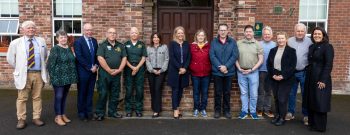December 13, 2024

Preparing for local, national and international emergencies
The annual cross border Humanitarian Disaster Assistance Course, was once again hosted by the United Nations Training School Ireland (UNTSI) in the Curragh Camp in Co. Kildare. This intensive 3-day training course, which is highly regarded by those with responsibility for responding to major emergency situations, is held in late autumn annually.
This is the 11th year of the training, which is co-sponsored and organised by the Co-operation and Working Together (CAWT) cross border health Partnership and Defence Forces Ireland. This specialised training course is specifically adapted to meet the requirements of participants from Ireland and Northern Ireland, and supports those with responsibility for responding to major emergency situations on the island of Ireland, or to those likely to be deployed to disaster zones worldwide.
The main topics covered in the course included:
- Planning for health-related issues typically associated with humanitarian responses to emergencies and disaster situations;
- supporting the psychosocial and mental health of the public, professional responders and humanitarian aid workers in emergencies;
- protection of the most vulnerable groups in emergencies, disasters and conflict;
- management of transmissible diseases; and
- co-ordination of medical air evacuation of casualties, etc.
 Organisers and participants at the 2024 cross border Humanitarian Disaster Response Course at the United Nations Training School Ireland
Organisers and participants at the 2024 cross border Humanitarian Disaster Response Course at the United Nations Training School Ireland
In total, 35 participants from a variety of sectors and agencies benefitted from this intensive, unique training opportunity delivered by experts. Course participants included health services medical personnel from both Ireland and Northern Ireland, Defence Forces Ireland, 2nd Medical Brigade, ambulance, police and non-governmental organisations (NGOs), all of whom have a role in emergency and disaster response, either nationally or internationally, or both.
Commenting on the success of the cross border training, CAWT’s Director General and Chief Executive of the Western Health and Social Care Trust, Neil Guckian said: “Over many years, the CAWT Partnership has co-ordinated both training and practical exercises, involving agencies north and south, to enhance cross border preparedness and responses to major medical emergencies, thus benefiting and protecting communities and citizens. This annual specialist training course is greatly valued as it enables our health and social care medical professionals, from both sides of the border, to train alongside other statutory and military personnel, to support any multi-agency response to a major medical emergency situation.” He added: “Our support for this event is in line with the goals of the CAWT Partnership of improving access to health services, reducing health inequalities and facilitating multi-sector cross border collaboration in order to improve the health and well-being of citizens living in the border region.”
Reflecting on the Defence Forces’ longstanding relationship with CAWT, Major General Adrian Ó Murchú, Deputy Chief of Staff Support, noted: “CAWT has been a great catalyst for building excellent working relationships on these islands. No matter where we come from, or what organisation we represent, there are complex challenges to face every week and sometimes every day. The solution to those challenges is always the same – teamwork and collaboration with partners. Teamwork and collaboration only succeed when relationships are strong. That is why the Humanitarian Disaster Assistance Course is so important. It builds relationships, North and South, East and West, it builds trust, and ultimately it builds friendships, which have proven to endure long after the course concludes.”
HSE National Director, Pat Healy said: “This specialist cross border training initiative, supports those agencies, including the HSE, to be prepared to provide mutual support, where a cross border response to a local or national emergency may be required. Furthermore, the intensive nature of the training has been excellent for developing a deeper shared understanding of the roles and approaches in both jurisdictions and has contributed to further enhancing relationships and networks across the border.”
Feedback from participants highlight the value of this unique learning and skills enhancement opportunity, as these selection of comments indicate:
“Course is relevant and based on current situations”
“Really relevant, feel more up-to-date, and I’ve had a great opportunity to consolidate and build on existing skills”
“Excellent course, great opportunity to meet experts in similar field of interest”
“Fantastic opportunity to hear from people from other services and disciplines”
The training was delivered by the Faculty of Conflict and Catastrophe Medicine which is part of the Worshipful Society of Apothecaries of London and is acknowledged as one of the leading training organisations in the field of humanitarian response training.
-Ends-



